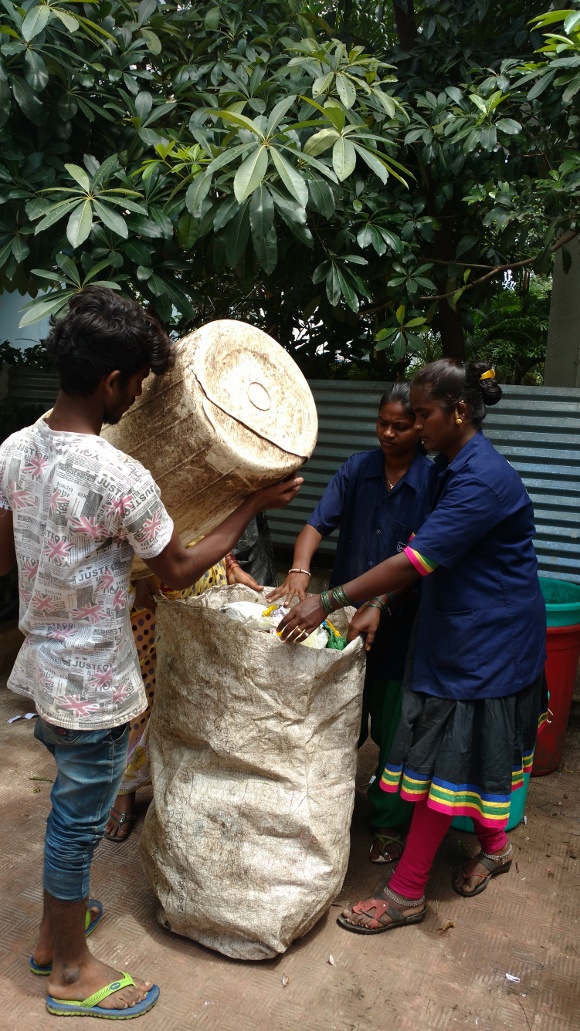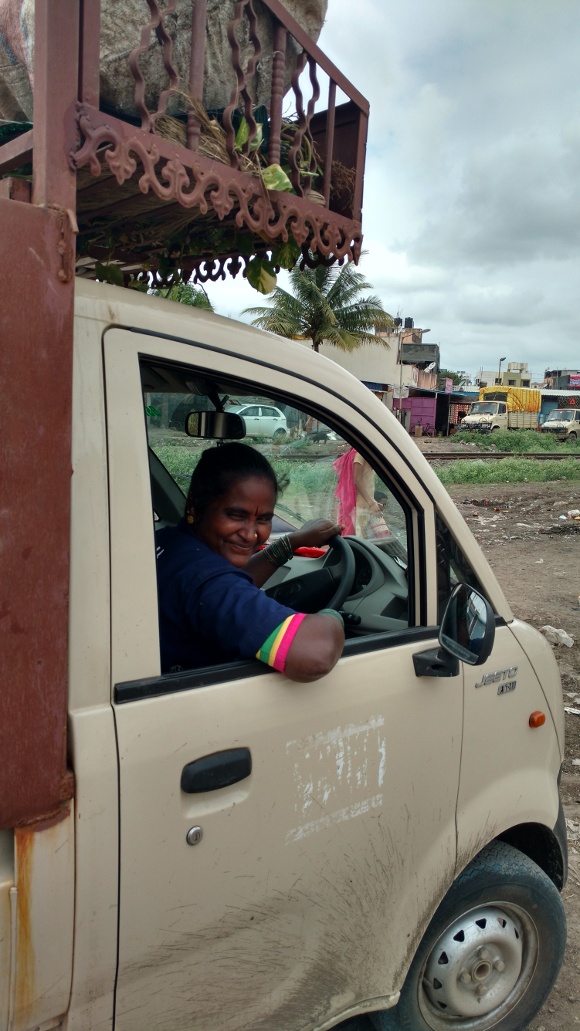Suman More, 50, is no stranger to picking herself up and getting on. So, when she fell during a recent Marathon in her city and bruised her hand and ankle she waved away most help, except for cleaning the wound, and continued on, proudly posing with her finisher’s medal at the end. There’s something inspiring and exceptional about this woman, who is the president of SWaCH, collective of 2800 waste pickers that provide garbage collection and other allied waste management services to 520,000 households in Pune.
From scouring the streets for recyclable waste decades ago, More has worked hard and gradually secured a comfortable future for herself and her family – her son is a journalist and her daughter-in-law teaches in a college – but she continues to do her rounds at waste collection and makes her own living. The earnings often go to educate youngsters in the community.

Urbanites rely on waste collectors to give them a clean start every day. Pic: Suchismita Pai\WFS
Waste pickers, especially, have a tough call: they are out on the streets working for long hours, at risk of being harassed and threatened. They are essential to any city’s waste management system and yet one of the most neglected groups, abused and underpaid. Nonetheless, in Pune, coming together to form a cooperative and an informal union has allowed them to grow and transform outlooks.
Working in the recycling industry as a waste picker, More has always had to push herself every day. “Educating my children was my priority and now they are all settled in white collar occupations. They want me to give up this work but for me that is not an option. I want to do this because it is important for the upkeep of my city,” adds the woman, who, these days, is as much at home in municipal meetings as the president of the first waste pickers’ cooperative as she is being on the streets.
SWaCH was set up a decade back and the scope of its work includes waste collection, resource recovery, trade and waste processing. The idea is to provide decent livelihoods for its members in the recycling industry. A one-of-its-kind model, it brings together waste generators, waste-pickers and the local government, the Pune Municipal Corporation (PMC).
While the households are encouraged to become more involved in waste management, the PMC benefits from the door-to-door service that SWaCH offers. But, mainly, the de-centralised model brings much-needed dignity, sustainability and cost efficiency to waste management, which is crucial to making the lives of waste-pickers better.
Pradnya Nagtilak has experienced first-hand the difference the support of a collective like SWaCH can make. She grew up watching her mother working in waste collection and recycling. “My mother left school after Class Seven, but she ensured we completed our education and did well,” she says. A chance conversation with a SWaCH administrative staff at one of her mother’s monthly waste pickers meetings led her to apply for the position of Prabhag coordinator.
Basically, SWaCH has instituted coordinators across 76 prabhag’s, or electoral wards, and they liaise between citizens and waste pickers and the PMC staff for the easy collection and disposal of garbage. A year later, Nagtilak is an inspiration to many of her mother’s colleagues because apart from ironing out the collection concerns she has taken up the cause of girls’ education. “I have personally taken up the cudgels with my mother’s colleagues to ensure they send their girls to school. I have even spoken on the issue of school dropouts to principals of local schools so they can take appropriate action. Having grown up with the challenges that waste pickers and their children face I am in a position to represent those issues to those who can affect change and waste pickers, too, are open to lending me an ear,” elaborates Nagtilak. Her own parents were very clear that she would not get married till she graduated and her sister is now studying to be a lawyer.
Like Nagtilak, Manisha Bhandare, too, is part of the waste management network, but rather than becoming a paid employee she put herself in the driver’s seat as an entrepreneur. At a time when her marriage to an abusive partner was breaking down, there was an initiative from the local waste-pickers trade union to teach women driving. Her father encouraged her to go ahead and even gave her his old tempo to practise on.
Today, she has moved out of the bad marriage along with her children and is staying with her parents. Her mother and she pooled their earnings for a couple of years, traded in the old tempo for a new truck that Bhandare drives herself.

Manisha Bhandare driving her own tempo to collect the waste. Pic: Suchismita Pai\WFS
Out at the crack of dawn, her mother and she have a couple of helpers and they collect waste from residential societies and commercial establishments. She and her band of helpers split the money after accounting for diesel, EMIs and maintenance. “My tempo doubles up as a school bus for the kids in my settlement as well. I weave in the drop and pick-up to school for my kids into my waste collection rounds and many other children jump in along the way. I am back in time to look after my kids when they get back from school. I like being in charge,” she says.
Sangita Gaikwad has found her calling, too. Having accompanied her mother to work for several years, when the opportunity to manage the wet waste at a housing society came up, she grabbed it with both gloved hands. Not only does she manage the collection she has developed an expertise at composting. “Not an ounce of the wet waste goes out of the gates and yet we have no foul smelling dumps to contend with,” says a happy resident.
“We are doing well but the battles are not over,” says Kavita Pawar, who represented the group at the third World Meeting of Popular Movements held in Vatican City, Rome, in November 2016, and explained the plight of waste pickers to an august audience which had, among other luminaries, Pope Francis. She states, “We are recycling agents and help slow down climate change, but never receive our due. We have to struggle to make ends meet despite the service we offer in keeping the city clean and the environment less polluted.”

Another SWaCH member Rajabai Sawant, who accepted back-to-back sanitation awards from the prime minister and the union minister of urban development, housing and urban poverty alleviation, agrees. “Whether it is the INDO-SAN award from the Ministry of Urban development or the Garbage Guru Award from India Today, such accolades rarely translate into tangible benefits. We accept them with all humility but it does not erase a lifetime of neglect. Smart Cities need to be inclusive. When sorting spaces from where we can efficiently divert waste from the landfills is taken away for paid parking, where is the inclusiveness or even the respect for the work we do? When we still get sanitary towels and diapers openly thrown in the trash we sort with our hands, where is the respect in that? When the sharp shards of broken glass in the daily waste bucket cut our hands, how do the awards matter? Efficiency and expertise should be integrated and emulated in the mainstream, but often we are treated as outsiders and outliers,” she says.
Urbanites rely on waste pickers to give them a clean start every day - and like all utility services they are taken for granted. “Imagine what life would be like if there was no electricity or running water and then imagine if those who worked with waste did not do so anymore. Isn’t it time to recognise that we do more than just collect garbage?” asks More.























